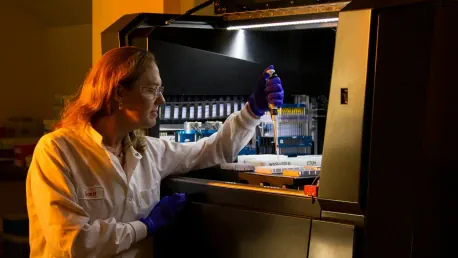Recce Pharmaceuticals, a Sydney-based biotechnology company, has successfully raised A$15.8 million to advance its groundbreaking anti-infective drugs into Phase 3 trials. This funding was obtained through a combination of private placement and an entitlement offer. Recce’s synthetic anti-infectives target diabetic foot infections (DFI) and acute bacterial skin and skin structure infections (ABSSSI), which are notoriously challenging medical conditions due to increasing antibiotic resistance. The raised capital will support critical clinical trials and potentially position Recce at the forefront of infection management therapies.
Funding Allocation and Trial Objectives
Registrational Phase 3 Trial for DFI Treatment in Indonesia
The funds will primarily be allocated to support a registrational Phase 3 trial for a topical diabetic foot infection treatment in Indonesia. Diabetic foot infections pose a severe risk for individuals with diabetes, often leading to complications and amputations. Indonesia represents a strategic choice for this trial, given the high prevalence of diabetes and related complications in the region. The trial aims to gather sufficient data to support a market authorization, with the goal of generating potential revenue by 2026.
Recce’s initiative to conduct the trial in Indonesia is both a strategic and humanitarian move, addressing a critical healthcare need in a region heavily impacted by diabetes. The focus will be on evaluating the efficacy and safety of their novel synthetic anti-infective, R327. This treatment aims to offer a more effective solution compared to existing antibiotics, particularly for bacterial strains showing resistance. Successful completion of this trial could establish the product as a new standard of care, potentially transforming the treatment landscape for diabetic foot infections.
Phase 3 ABSSSI Trial in Australia
Additionally, the funding will be utilized to initiate a Phase 3 trial for treating acute bacterial skin and skin structure infections in Australia. This follows the favorable outcomes of a Phase 2 study, which demonstrated significant efficacy and safety of Recce’s synthetic anti-infective. ABSSSI poses substantial health risks, leading to extended hospital stays and increased healthcare costs, especially with the rise of antibiotic-resistant bacteria. By advancing to Phase 3, Recce seeks to confirm the treatment’s effectiveness in a larger patient population, paving the way for regulatory approval and commercial launch.
This trial in Australia will focus on consolidating the data gathered in earlier phases to ensure comprehensive safety and efficacy profiles. The goal is to meet the stringent regulatory requirements necessary for market approval. A successful trial outcome could provide patients with a superior treatment option, reduce hospital stays, and lower healthcare costs associated with bacterial infections. The investment in this trial underscores the importance of having effective alternatives in the fight against antibiotic-resistant bacteria.
Corporate Support and Shareholder Engagement
CEO and Shareholder Perspectives
Recce Pharmaceuticals’ CEO, James Graham, expressed enthusiasm about the financial backing, particularly from an existing Australian shareholder who had consistently supported the company. Graham highlighted the launch of an entitlement offer, inviting all shareholders to purchase new shares at the same price as the placement. This approach not only strengthens the financial foundation of the company but also fosters a sense of ownership and confidence among shareholders in Recce’s growth trajectory.
The funding marks a pivotal moment for Recce, as noted by The Australian’s Stockhead column. Significant investor support and active board-level participation in the entitlement offer underscore the confidence in Recce’s strategic direction. This robust financial support is a testament to the potential seen in Recce’s synthetic anti-infective pipeline. The pipeline is positioned as a potential “new standard of care” for treating severe bacterial infections, particularly those resistant to multiple antibiotics.
Market Dynamics and Stock Performance
On April 9, 2025, the company experienced a 7.69% dip in its stock price to A$0.30. Despite this minor setback, Recce remains optimistic, viewing the capital raise and planned trials as catalysts for future growth. The decrease in stock price does not overshadow the long-term vision and the strategic steps being taken. The ongoing support from shareholders and the broader investor community is expected to drive the company’s initiatives forward. By maintaining a focus on clinical trial success, Recce aims to enhance shareholder value and solidify its market position.
Industry Context and Future Outlook
Addressing Antibiotic Resistance
Recce’s endeavors come at a time when the pharmaceutical industry is increasingly focused on developing novel anti-infectives to combat antibiotic resistance. This growing concern has been exacerbated by the overuse and misuse of antibiotics, leading to a surge in resistant bacterial strains. Consequently, there is a significant demand for innovative treatments that can effectively address these challenges. Recce’s synthetic anti-infectives stand out as a promising solution, potentially altering treatment protocols by providing robust alternatives to traditional antibiotics.
The company’s commitment to innovative treatment solutions aligns with the broader industry trend of prioritizing research and development in anti-infectives. By advancing its clinical trials and focusing on regions and conditions where the medical need is high, Recce is poised to contribute significant advancements in infection management. The success of these initiatives could set new benchmarks in the pharmaceutical industry, encouraging further investment and research into synthetic anti-infectives.
Potential Impact on Treatment Standards
Recce Pharmaceuticals, a biotechnology firm based in Sydney, has successfully secured A$15.8 million to advance its innovative anti-infective drugs into Phase 3 trials. This substantial funding was raised through both private placement and an entitlement offer. Recce is focusing on synthetic anti-infectives aimed at combating diabetic foot infections (DFI) and acute bacterial skin and skin structure infections (ABSSSI). These conditions are notoriously difficult to treat due to the increasing problem of antibiotic resistance. The newly acquired capital will be used to support crucial clinical trials, which could potentially place Recce at the forefront of infection management therapies. By advancing their treatments through these critical stages, Recce aims to address the growing global health challenge posed by resistant infections and improve patient outcomes significantly. As antibiotic resistance continues to be a significant threat, innovative solutions like Recce’s drugs are essential for the future of effective infection management.









